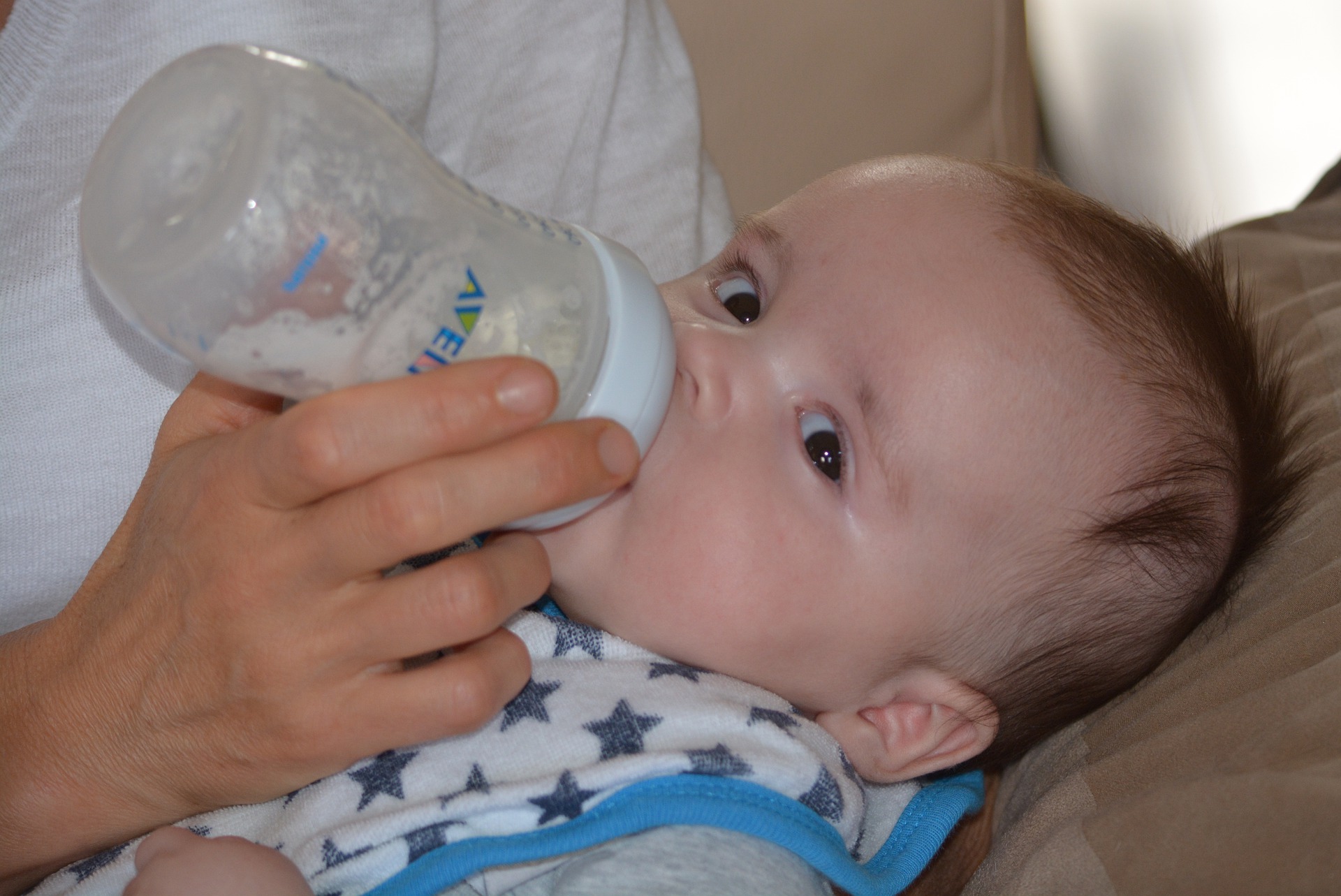It is a challenge for most new parents to read the signs that their newborn is trying to communicate. My tips in this article will discuss 10 signs formula doesn’t agree with baby, one of the most common concerns for many parents. If you notice any of these signs, please consult with your pediatrician as soon as possible. Thanks for reading!
Table of Contents
- Sign 1: The Baby Is Fussy Or Has Colic.
- Sign 2: The Baby Isn’t Gaining Weight As Expected.
- Sign 3: Baby Has Gas Or Constipation.
- Sign 4: Baby Has Difficulty Breastfeeding Or Sucking From A Bottle.
- Sign 5: Baby Has A Rash Or Other Skin Problems.
- Sign 6: Baby’s Poop Is Unusual In Color, Consistency, Or Smell.
- Sign 7: Baby Has Excessive Split-Up Or Vomiting.
- Sign 8: Your Baby Is Still Hungry After Feeding.
- Sign 9: Baby Isn’t Responsive Or Interacts Less With Others Than Usual.
- Sign 10: Baby Has Trouble Breathing.
- Final Reminders From Sharon Dunn
Sign 1: The Baby Is Fussy Or Has Colic.
Babies often cry even when everything seems normal. Some babies scream more than others, and these babies are frequently referred to as fussy.

Colic, on the other hand, occurs when a healthy baby screams for longer than three hours a day, more than three days a week. Usually, the crying begins unexpectedly at around the same time every day. According to some experts, up to half of all babies suffer from colic. Although the exact etiology of colic is unknown, it has been suggested that gastrointestinal gas or a developing neurological system may be to blame.
If your baby is fussy after feedings or is showing Colic tendencies, this may be one of the signs formula doesn’t agree with baby. Look for other signs of discomfort such as excessive gas or bloating, which could also indicate that the formula is not agreeing with your baby’s system.
Sign 2: The Baby Isn’t Gaining Weight As Expected.
Children and babies develop at various rates. However, if the baby is constantly not gaining weight as expected, this might be because the baby isn’t digesting the formula well.
It is important to reconsider the formula when this sign shows up because lack of weight gain will negatively affect children’s overall growth and development. Their ability to walk might be delayed, and they might not grow as tall as they should. Additionally, their cognitive performance can be impacted.
Sign 3: Baby Has Gas Or Constipation.
When your baby first begins consuming infant formula, which is more difficult to digest than breast milk or eating processed meals, gas and constipation are frequently observed. This is because their body is still adapting to consuming new foods.
Since babies’ digestive systems are still developing, some gas will likely be produced as they adapt and mature. Typically, infant gas does not signify a health concern. However, infants can experience discomfort and even pain when the air becomes trapped in their stomachs. Even while gas typically goes away on its own, parents may wish to identify the reason to prevent it from occurring frequently, one reason could be the inappropriateness of the formula.
Constipation in infants might be difficult to identify. If your baby is having hard, dry stools less than three times a week or if they seem to be straining during bowel movements, this could indicate that the formula is constipating them. Again, be sure to monitor wet diaper output and weight gain to ensure they are getting enough fluids and nutrients.
Sign 4: Baby Has Difficulty Breastfeeding Or Sucking From A Bottle.
Babies have a natural reflex to sucking from birth. However, from 2 to 3 months of age, that response stops being automatic. In practice, this allows infants to refuse a feeding if they find it uncomfortable. Some babies have difficulty sucking on the bottle. The bottle’s nipple is too large for your baby’s mouth, the formula flowing too slowly, or they simply do not tolerate the formula. This sign might also be due to factors other than the formula such as conditions like tongue tie, cleft lip, or palate. Check other signs in this blog if you observed this indication.
Sign 5: Baby Has A Rash Or Other Skin Problems.
Most infants experience occasional minor acne, dry skin, and rash, but recurring rashes that won’t go away or keeps reappearing are usually an indication of something more serious. A rash around your baby’s mouth or on their bottom may be one of the signs formula doesn’t agree with baby. This could be caused by an intolerance or sensitivity to a certain ingredient in the formula.
Sign 6: Baby’s Poop Is Unusual In Color, Consistency, Or Smell.
You can anticipate your baby’s excrement to resemble peanut butter when they are fed formula. Poop comes in a broad variety of regular colors, with brown, yellow, and greenish-yellow being the most common. Your baby may not be responding well to the formula if they are constipated or have an exceptionally hard stool. The majority of infants will thrive on formula made from cow’s milk, but some infants will have softer stools on a more specialized formula, including one that is partially hydrolyzed. Your baby’s poop might also have mucus or blood which might also be one of the signs formula doesn’t agree with baby contains an active component to which your infant is allergic or sensitive.
Sign 7: Baby Has Excessive Split-Up Or Vomiting.
If your infant is vomiting frequently and violently, this is different from spitting up. Repeated vomiting over a brief period, could be a symptom of an illness or a condition requiring medical attention. If it occurs frequently and lasts more than a few days, there may be a problem that has to be addressed. This can be one of the signs formula doesn’t agree with baby, or you are using an inadequately mixed, stored, or handled formula. If you notice either of these signs, be sure to keep an eye on your baby’s wet diaper output and weight gain to ensure they are getting enough nutrients.
Sign 8: Your Baby Is Still Hungry After Feeding.

After feeding, your infant may grasp for the bottle, place their hands in their face or mouth, or even smack their lips to indicate they are still hungry. Observing your baby’s eating pattern and reactions after feeding will help you understand whether these are hunger cues, indicators of acid reflux, or simply one of the signs formula doesn’t agree with baby.
Sign 9: Baby Isn’t Responsive Or Interacts Less With Others Than Usual.
This sign is more difficult to observe, but if you notice that your baby isn’t as responsive or interactive as usual, it could be a sign that the formula doesn’t agree with them. Furthermore, your baby being irritable or cranky after feedings could also be a sign that they are not tolerating their formula well.
Sign 10: Baby Has Trouble Breathing.
Finally, babies sometimes have trouble breathing if they don’t like the formula that is given to them. This might also be a result of an allergic reaction to some ingredients in the formula.
Final Reminders From Sharon Dunn
There might be other signs formula doesn’t agree with baby that are not listed here but always remember to listen to your parental instincts. If you notice any of these signs, please consult with your pediatrician as soon as possible. They will be able to help you determine if the formula doesn’t agree with your baby and make recommendations for alternative formulas or foods. Thank you for reading! We hope this blog post was helpful. Please feel free to share it with other parents who may find it useful. Have a great day!











